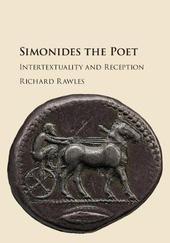
|
Simonides the Poet: Intertextuality and Reception
Hardback
Main Details
| Title |
Simonides the Poet: Intertextuality and Reception
|
| Authors and Contributors |
By (author) Richard Rawles
|
| Physical Properties |
| Format:Hardback | | Pages:318 | | Dimensions(mm): Height 235,Width 183 |
|
| Category/Genre | Literary studies - classical, early and medieval
Literary studies - poetry and poets |
|---|
| ISBN/Barcode |
9781107141704
|
| Classifications | Dewey:884.01 |
|---|
| Audience | | Professional & Vocational | |
|---|
| Illustrations |
2 Halftones, black and white
|
|
Publishing Details |
| Publisher |
Cambridge University Press
|
| Imprint |
Cambridge University Press
|
| Publication Date |
19 April 2018 |
| Publication Country |
United Kingdom
|
Description
Simonides is tantalising and enigmatic, known both from fragments and from an extensive tradition of anecdotes. This monograph, the first in English for a generation, employs a two-part diachronic approach: Richard Rawles first reads Simonidean fragments with attention to their intertextual relationship with earlier works and traditions, and then explores Simonides through his ancient reception. In the first part, interactions between Simonides' own poems and earlier traditions, both epic and lyric, are studied in his melic fragments and then in his elegies. The second part focuses on an important strand in Simonides' ancient reception, concerning his supposed meanness and interest in remuneration. This is examined in Pindar's Isthmian 2, and then in Simonides' reception up to the Hellenistic period. The book concludes with a full re-interpretation of Theocritus 16, a poem which engages both with Simonides' poems and with traditions about his life.
Author Biography
Richard Rawles is Lecturer in Greek at the University of Edinburgh, and has previously taught at the University of St Andrews, University College London and the University of Nottingham. With Peter Agocs and Chris Carey he has co-edited two volumes on epinician poetry, and his other publications include articles on Aeschylus, Simonides, Sappho and Theocritus.
|